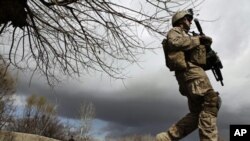A senior United Nations official says security in Afghanistan is at its lowest point since the departure of the Taliban 10 years ago. He said aid agencies are unable to deliver humanitarian assistance to 40 percent of the country and that access to many other areas is limited.
In his two years as U.N. humanitarian coordinator in Afghanistan, Robert Watkins said security in the country has steadily deteriorated. The outgoing envoy said that between 2009 and 2010, insurgent attacks increased by 66 percent and civilian casualties rose by 20 percent.
In addition, Watkins said more than 700 NATO soldiers were killed last year - the highest death toll since the beginning of the war. Violence has increased as the Taliban insurgency spreads from the southern provinces of Helmand and Kandahar to many other parts of the country.
The U.N. official said NATO has justified its military surge by arguing that security will get worse before it gets better.
"We are at a phase right now where we have not seen things turning the corner," said Watkins. "We are told that they are getting better, but it has not yet translated into tangible improvements insofar as the way that we are able to deliver assistance in Afghanistan."
Watkins also noted that access to different parts of Afghanistan has been getting progressively worse over the past decade. He said the United Nations currently can effectively deliver aid to a third of the country and limited assistance to another 30 percent. He said, however, the remainder of the country is off limits.
In the past, NATO has dispersed humanitarian assistance to the Afghan people. Watkins said this has contributed to a perception by Afghans and the insurgents that humanitarian aid is linked to military action.
Watkins said it is crucial NATO understands how important it is to keep these two roles separate. At the same time, the U.N. envoy said it is important the humanitarian community establishes and maintains strong relations with insurgent groups in order to ensure the delivery of aid.
Watkins said U.N. agencies in the past have successfully negotiated with local commanders of the Taliban to gain access to parts of the country that they control to deliver vaccination and other programs.
"But, it is important that we intensify those contacts so that we can go to even greater parts of the country with some kinds of guarantees of safety. "But, as I say, we have had a problem and we continue to have a problem of them perceiving this international assistance as being part of a wider international political, military program, which, of course, it is not," said Watkins.
Watkins said the United Nations also is having difficulty obtaining funds for its humanitarian operations, because he said donors see Afghanistan as being a post-conflict country only in need of rehabilitation aid.
The U.N. official said donors must understand the conflict in Afghanistan is far from over and the people remain in desperate need of humanitarian assistance.
Afghan Security Worries Top UN Envoy
- By Lisa Schlein




